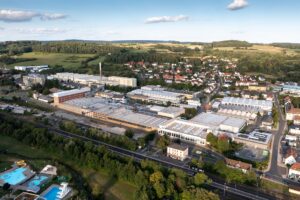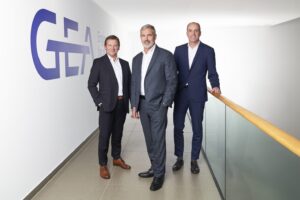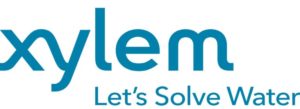Gardner Denver, Inc. Reports 2003 Results
Gardner Denver, Inc. announced that revenues for the three months ended December 31, 2003 were $116.6 million, a 12% increase compared to the fourth quarter of the previous year. Net income for the three-month period of 2003 was $6.5 million, a 39% increase compared to the same period last year.
Diluted earnings per share (DEPS) in the three-month period of 2003 were $0.40, 38% better than $0.29 in the previous year. Revenues for the twelve-month period were $439.5 million, 5% more than the results of the previous year and DEPS for the year were $1.27, 4% higher than $1.22 in 2002.
CEO’s Comments Regarding Results
“As previously expected, the second half of 2003 was better than the first half and I believe we are beginning to see a gradual improvement in the U.S. industrial economy which will benefit demand for our compressed air products. Manufacturing capacity utilization has been improving, but remains 5.5 percentage points below the key level of 80%. I am encouraged by the current U.S. economic indicators, such as industrial production, and gratified that the efforts we have made over the past year are resulting in noticeable operational improvements.
In 2003, demand for well stimulation pumps and pump replacement parts increased significantly year-over-year. Although sales of drilling pumps have still not increased appreciably, I believe that demand for oil and natural gas products will continue to improve in 2004. We are positioning drilling pump inventory to capitalize on this projected upturn to minimize leadtime and capture incremental demand,” stated Ross J. Centanni, Chairman, President and CEO.
“I am pleased with the progress we have made in strengthening our balance sheet. Our working capital as a percentage of revenues is the lowest it has been since 1998, the peak of our previous operating cycle. Our receivables are in excellent condition and inventory turnover improved to 4.9 times in the fourth quarter, despite the previously mentioned increase in drilling pump inventory to meet anticipated demand.
Cash flow from operations was approximately $46 million for the year, which enabled us to repay $30 million in debt (excluding funds borrowed to acquire Syltone plc), fund a small machine shop acquisition and invest $12 million in capital to improve our operations. Our ability to generate strong operating cash flow in a period of weak economic demand is a key strength for our Company. We believe that we are well positioned to pursue our strategies for growth, including synergistic acquisitions.”
“We previously announced an aggressive profitability improvement program to eliminate redundant manufacturing capacity, streamline operations and reduce costs. This program includes closing three facilities to further integrate previously completed acquisitions, narrowing the focus of the marketing strategies of our German blower and U.K. compressor businesses, establishing an assembly and packaging facility in China and implementing manufacturing process and system improvements to reduce inventory. By the end of 2003, all three facilities were closed and the marketing strategies of the German and U.K. operations had been refocused.
We reduced manpower through layoffs and proactive early retirements and broke ground on our new facility in China. We have also implemented approximately one-third of the planned manufacturing process and system improvements to reduce inventory. I am pleased with the progress that we have made to date and look forward to the benefit of these efforts going forward.”
Syltone Acquisition
In early January 2004, we completed the acquisition of Syltone for a purchase price of approximately £61 million, including assumed debt. Syltone is headquartered in Bradford, England, with manufacturing facilities in England, Germany, France, Canada, Denmark and the U.S. The company also operates fitting shops around the world, which assemble its manufactured components and other parts onto commercial vehicles.
The company generated sales of £84.4 million (approximately $152.0 million at a translation rate of $1.80/£) and operating profit (pretax) of £6.3 million (approximately $11.3 million at a rate of $1.80/£) for the twelve months ending September 30, 2003. These pound sterling financial results were reported in accordance with accounting principles generally accepted in the U.K.
Syltone’s principal activity is the design, manufacture, sales and service of specialty equipment for the international transportation and fluid transfer industries. Their product portfolio includes compressors, blowers and accessories for the commercial vehicle market, loading arms for rail, truck and marine applications and other complementary products. The U.K. and North America are Syltone’s largest markets, representing approximately 25% and 19% of sales, respectively, for the twelve months ended September 30, 2003. Other key served markets are France (13%) and Germany (8%), with the rest of the world providing approximately 35% of revenues.
Approximately 70% of Syltone’s revenues are generated through transportation-related activities. These activities include the design and manufacture of equipment for handling dry bulk or liquid product on commercial vehicles; the provision of on-board power; and the design and manufacture of access platforms, axles and gearboxes for commercial and military applications, and power take-offs. The remainder of Syltone’s revenues result from the design and manufacture of equipment for loading and offloading liquids from ships, railcars and road vehicles, as well as dry-break couplings. Often the loading arms for road vehicles will be used to fill commercial vehicles fitted with products manufactured and assembled by Syltone. Additionally, there are some products manufactured by Syltone, such as valves, which are used in both transportation and fluid transfer applications.
"We believe the combination of Syltone and Gardner Denver creates a leading global provider of solutions for customers in the transportation and bulk product handling industries. Syltone’s strong brand names and product breadth enhances our ability to serve these industries around the world. This acquisition expands our presence internationally and provides us with complementary new products and channels,” stated Centanni. “Syltone’s installation and aftermarket capabilities are expected to improve Gardner Denver’s ability to provide loading/unloading solutions for the bulk transportation industry and strengthen our distribution and service networks. The complementary nature of this acquisition is also expected to create manufacturing, marketing and purchasing leverage.”
In November 2003, Gardner Denver borrowed approximately $92 million and committed approximately $12 million of its cash to demonstrate an ability to finance and complete the acquisition of Syltone, which was a publicly traded U.K. company. These borrowed funds were invested in short-term instruments and resulted in unusually large cash and debt balances as of December 31, 2003.
Outlook
Looking forward, Mr. Centanni stated, “We believe that the demand outlook for 2004 is slightly better for industrial products than we experienced in 2003 and we expect a gradual improvement in revenue volume throughout the year as a result of a slowly recovering U.S. industrial economy. Our packaging operation in China, which will be operational by the end of the third quarter of 2004, should facilitate further material cost reductions as we access lower-cost suppliers of castings and package components. We continue to expand and strengthen our distribution channels in the U.S., Europe and Asia, and invest in new product development.”
“The Syltone acquisition will help us realize synergies and further operational improvements. Our working capital requirements, as a percentage of revenues, should continue to decline and our inventory reduction program is expected to yield further inventory turnover improvements in 2004.”
“We expect improved demand for well servicing pumps and replacement parts in 2004. We believe that our investment in drilling pump inventory will help secure orders requiring shorter lead times and expedite our responsiveness to increased demand. If natural gas prices remain elevated, supported by an economic recovery, demand for well servicing and drilling should further increase demand for petroleum pumps in 2004.”
“Based upon the current economic environment, the benefit of the Syltone acquisition and the profitability improvement projects noted earlier, the Company currently expects DEPS to be approximately $0.26 to $0.33 for the first quarter of 2004. This estimate assumes $0.00 to $0.03 in incremental earnings from the acquisition of Syltone and an overall effective tax rate of 34% in 2004.
DEPS is expected to be approximately $1.45 to $1.65 for the year, depending on the increase in revenue volume, which is within the range of our previous guidance after adjusting for the addition of Syltone and the higher effective tax rate. We currently anticipate that Syltone will generate $0.13 to $0.19 in incremental DEPS for 2004. This estimate is net of an anticipated non-recurring, non-cash reduction to earnings of $0.03 to $0.07, as a result of the application of acquisition-related accounting principles generally accepted in the U.S. (primarily the adjustment of inventory to fair value).”
Fourth Quarter Results
Revenues for the three-month period increased $12.7 million (12%) to $116.6 million, compared to the same period of 2002, due to increased volume and favorable changes in foreign currency exchange rates ($4.8 million or 5%). Compared to the same period of 2002, Compressed Air Products revenues increased $11.1 million (13%) to $97.8 million due to increased shipments of rotary screw compressors and blowers and favorable changes in foreign currency exchange rates of $4.8 million.
Pump Products revenues for the three-month period increased $1.6 million (10%) compared to the same period of 2002, primarily as a result of increased demand for well stimulation pumps and petroleum pump parts, partially offset by lower shipments of drilling pumps.
The aggregate financial impact of the profitability improvement program discussed previously reduced DEPS in the fourth quarter of 2003 by approximately $0.12. The majority of the fourth quarter expenses were for severance and fringe benefits costs associated with the reduction in manpower and therefore primarily impacted cost of sales ($2.1 million) and selling and administrative expenses ($0.6 million).
Some additional expenses related to these projects are expected to be incurred in 2004, but the benefits realized should offset the incremental costs. The net impact on DEPS in 2004 is currently expected to be a net reduction of $0.01 in the first quarter, offset by a $0.01 net improvement in the fourth quarter results. By 2005, these projects should generate ongoing annual improvements in DEPS of approximately $0.09 to $0.11.
Operating earnings as a percentage of revenues for the Compressed Air Products segment were 6.6% for the three-month period of 2003, compared to 7.2% in the same period of 2002. The expenses associated with the previously mentioned profitability improvement projects reduced the 2003 results for this segment by 2.7 percentage points. Higher compensation and post-retirement expenses also negatively impacted results in 2003. These negative factors were partially offset by lower medical costs and the positive impact of increased leverage of the segment’s fixed and semi-fixed costs over a higher revenue base.
Pump Products operating earnings as a percentage of revenues decreased to 5.9% for the three-month period ended December 31, 2003, compared to 9.6% in the comparable period of 2002. The profitability improvement projects reduced results for this segment by 0.9 percentage points. The remaining decrease in operating earnings as a percentage of revenues was attributable to higher compensation and post-retirement expenses and a lower proportion of drilling pump sales resulting in unfavorable mix.
Due to the strengthening of the pound sterling against the U.S. dollar in the latter half of the fourth quarter, foreign currency transaction gains related to a portion of the funds borrowed to complete the Syltone acquisition increased pretax income by $3.2 million ($0.13 DEPS) for the three-month period ended December 31, 2003. An additional foreign currency gain of $1.2 million ($0.05 DEPS) will be recognized on these funds in the first quarter of 2004, as a result of further strengthening of the pound sterling in January, prior to finalizing the acquisition and the related permanent debt structure.
Net income was $6.5 million for the three-month period ended December 31, 2003, compared to $4.7 million in the same period of 2002. The 2003 results reflect an effective tax rate of 32%, compared to 24.7% in the fourth quarter of 2002. The unusually low income tax rate in the previous year resulted from a cumulative adjustment to lower the full-year effective rate to 32% for 2002. DEPS was $0.40 for the fourth quarter of 2003, compared to $0.29 in the previous year.
The 38% improvement in DEPS compared to the previous year is attributable to the foreign currency transaction gain noted earlier, volume increases, lower medical costs and operational improvements. These factors were partially offset by the impact of expenses associated with implementing the profitability improvement projects, discussed previously, and higher compensation and post-retirement expenses.
Full Year Results
For the year, revenues increased $21.4 million (5%) to $439.5 million compared to 2002, primarily due to favorable changes in foreign currency exchange rates. Compressed Air Products revenues increased $19.0 million (5%) compared to 2002. Favorable changes in foreign currency exchange rates increased Compressed Air Products revenues by $17.3 million. Pump Products revenues for the year increased $2.4 million (4%) compared to 2002, as a result of increased shipments of well stimulation pumps and petroleum pump replacement parts, partially offset by lower drilling pump shipments. In 2002, Pump Products revenues were primarily supported by drilling pump backlog carried over from 2001 orders.
Net income was $20.6 million ($1.27 DEPS) for the twelve-month period of 2003, compared to $19.6 million ($1.22) in 2002. Favorable changes in exchange rates increased net income by approximately $0.8 million ($0.05 DEPS) in 2003, compared to the previous year. The improvement in net income and DEPS reflect the fourth quarter foreign currency transaction gain, favorable changes in exchange rates, increased revenue volume in the second half of 2003, cost reductions, operational improvements and lower medical and interest expenses.
These benefits were partially offset by expenses associated with implementing the profitability improvement projects, higher compensation and post-retirement expenses, costs associated with a disruption within our casting supply chain and unfavorable sales mix due to the reduction of drilling pump sales.
Cautionary Statement Regarding Forward-Looking Statements
All of the statements in this release, other than historical facts, are forward-looking statements made in reliance upon the safe harbor of the Private Securities Litigation Reform Act of 1995, including, without limitation, the statements under the “CEO’s Comments Regarding Results” and “Outlook” sections. As a general matter, forward-looking statements are those focused upon anticipated events or trends and expectations and beliefs relating to matters that are not historical in nature. Such forward-looking statements are subject to uncertainties and factors relating to Gardner Denver’s operations and business environment, all of which are difficult to predict and many of which are beyond the control of the Company. These uncertainties and factors could cause actual results to differ materially from those matters expressed in or implied by such forward-looking statements. The following uncertainties and factors, among others, could affect future performance and cause actual results to differ materially from those expressed in or implied by forward-looking statements: (1) the ability to maintain and to enter into key purchasing, supply and outsourcing relationships; (2) the ability to effectively manage the transition of iron casting supply to alternate sources and the skill, commitment and availability of such alternate sources; (3) the ability to identify, negotiate and complete future acquisitions; (4) the speed with which the Company is able to integrate acquisitions and realize the related financial benefits; (5) the successful implementation of other strategic initiatives, including, without limitation, restructuring plans, inventory reduction programs and other cost reduction efforts; (6) the domestic and/or worldwide level of oil and natural gas prices and oil and gas drilling and production, which affect demand for the Company’s petroleum products; (7) changes in domestic and/or worldwide industrial production and industrial capacity utilization rates, which affect demand for the Company’s compressed air products; (8) pricing of Gardner Denver products; (9) the degree to which the Company is able to penetrate niche and international markets; (10) the ability to attract and retain quality management personnel; (11) market performance of pension plan assets and changes in discount rates used for actuarial assumptions in pension and other post-employment obligation and expense calculations; (12) the continued ability to effectively manage and defend litigation matters pending, or asserted in the future, against the Company; (13) the development and acceptance of the Company’s new product offerings; and (14) the continued successful implementation and utilization of the Company’s electronic services. The Company does not undertake, and hereby disclaims, any duty to update these forward-looking statements, even though its situation and circumstances may change in the future.
Comparisons of the financial results for the three and twelve-month periods ended December 31, 2003 and 2002 follow can be seen on the Gardner Denver’s website.
Source: Gardner Denver, Inc.





